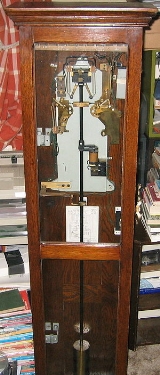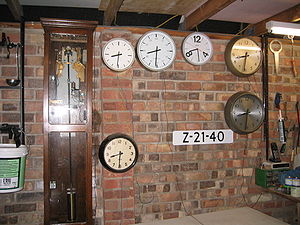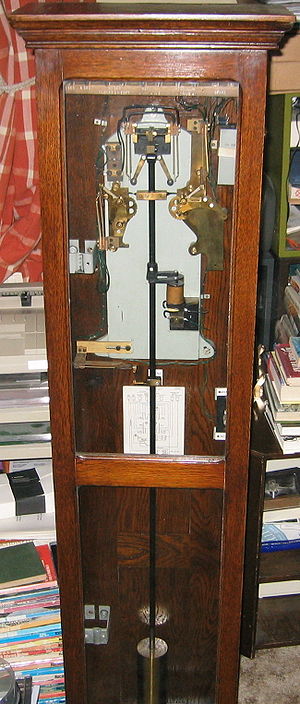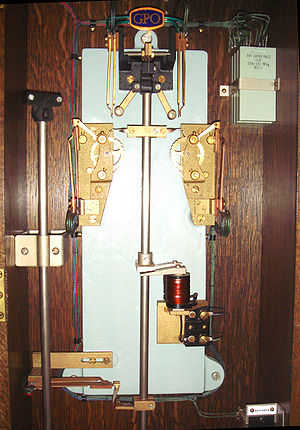
Master clock
Encyclopedia

Clock
A clock is an instrument used to indicate, keep, and co-ordinate time. The word clock is derived ultimately from the Celtic words clagan and clocca meaning "bell". A silent instrument missing such a mechanism has traditionally been known as a timepiece...
that provides timing signals to synchronize slave clocks
Slave clock
In telecommunication, a slave clock is a clock that is coordinated with a master clock. Slave clock coordination is usually achieved by phase-locking the slave clock signal to a signal received from the master clock...
as part of a clock network
Clock network
A clock network or clock system is a set of clocks designed to always show exactly the same time by communicating with each other. Clock networks usually include a central master clock kept in sync with an official time source, and one or more slave clocks which receive and display the time from...
. The master clock in such installations is controlled by an accurate quartz crystal oscillator, usually referenced to an external frequency standard such as MSF, which is part of a world-wide timekeeping system.
In the days before the availability of such highly accurate reference time many master clocks were an accurate electrically maintained pendulum clock. Thousands of such clocks were installed, in schools, offices, railway networks, telephone exchanges and factories all over the world; they resembled a longcase clock
Longcase clock
A longcase clock, also tall-case clock, floor clock, or grandfather clock, is a tall, freestanding, weight-driven pendulum clock with the pendulum held inside the tower, or waist of the case. Clocks of this style are commonly 1.8–2.4 metres tall...
, but had a very robust mechanism and a less ornate case. The clock timing signals, generated by electrical contacts attached to the mechanism, were minute, half minute and sometimes one second electrical pulses, fed to the controlled equipment on pairs of wires. The devices driven could be wall clocks, tower clocks, factory sirens, school bells and occasionally clock chiming mechanisms. Some types, such as the Synchronome had optional extra mechanisms to compare the time of the clock with a standard received from the GPO installation at Rugby, which allowed small weights to be added or removed from the pendulum without interruption. Small weights could also be added or removed manually in the absence of this mechanism again without interruption.
The British Post Office (GPO
Post office
A post office is a facility forming part of a postal system for the posting, receipt, sorting, handling, transmission or delivery of mail.Post offices offer mail-related services such as post office boxes, postage and packaging supplies...
) used such master clocks in their electromechanical telephone exchanges to generate the call timing pulses necessary to charge telephone subscribers for their calls, and to control sequences of events such as the forcible clearing of connections where the calling subscriber failed to hang up after the called subscriber had done so. The UK had three such manufacturers, all of whom made clocks to the same GPO specification and which used the Hipp Toggle
Electric clock
An electric clock is a clock that is powered by electricity instead of powered manually or by other sources of energy, specifically in order to wind the mainspring or to drive the pendulum or oscillator.-Classification:...
impulse system; these were Gent and Co., of Leicester, Magneta Ltd of Leatherhead in Surrey, and Synchronome Ltd of Alperton, north-west London.
A modern, atomic version of a Master Clock is the large clock ensemble found at the U.S. Naval Observatory
 |
 |
External links
- http://www.hvtesla.com/masters/masters_index.html All about electric master and slave clocks

